- Home
- Robin Hobb
The Golden Fool ttm-2
The Golden Fool ttm-2 Read online
The Golden Fool
( The Tawny Man - 2 )
Robin Hobb
The second in the thrilling new fantasy series, from the author of the bestselling Assassin trilogy.
Fitz has succeeded in rescuing Prince Dutiful from the clutches of the Piebald rebels, and has returned with him to Buckkeep castle. With Dutiful safe again, Queen Kettricken can proceed with plans to marry him to the Outislander princess, Elliania. However, with tensions building among the peoples of the Six Duchies over Kettricken's tolerance of the Wittted, even Buckkeep is no longer safe. A reluctant Fitz is assigned to protect the young prince, and also train him in the Skill, and in doing so he finally makes contact not only with his estranged daughter, Nettle, but with someone in Buckkeep who may possess a greater Skill talent even than Fitz. And who may represent a terrible threat to the Farseers.
Meanwhile, Elliania arrives and, before she will accept Prince Dutiful's betrothal, challenges him to undertake an impossible quest. He must kill a legendary Outislander dragon.
The Golden Fool
The Tawny Man Trilogy, Book II
by Robin Hobb
PROLOGUE
Losses Sustained
The loss of a bond beast is a difficult event to explain to the non-Witted. Those who can speak of the death of an animal as ‘it was only a dog’ will never grasp it. Others, more sympathetic, perceive it as the death of a beloved pet. Even those who say, ‘It must be like losing a child, or a wife’ are still seeing only one facet of the toll. To lose the living creature that one has been linked with is more than the loss of a companion or loved one. It was the sudden amputation of half my physical body. My vision was dimmed, my appetite diminished by the insipid flavour of food. My hearing was dulled and
The manuscript, begun so many years ago, ends in a flurry of blots and angry stabbings from my pen. I can recall the moment at which I realized I had slipped from writing in generalities into my own intimate rendering of pain. There are creases on the scroll where I flung it to the floor and stamped on it. The wonder is that I only kicked it aside rather than committing it to the flames. I do not know who took pity on the wretched thing and shelved it on my scroll rack. Perhaps it was Thick, doing his tasks in his methodical, unthinking way. Certainly I find nothing there that I would have saved.
So it has often been with my writing efforts. My various attempts at a history of the Six Duchies too often meandered into a history of myself. From a treatise on herbs my pen would wander to the various treatments for Skill-ailments. My studies of the White Prophets delve too deeply into their relationships with their Catalysts. I do not know if it is conceit that always turns my thoughts to my own life, or if my writing is my pathetic effort to explain my life to myself. The years have come and gone in their scores of turnings, and night after night I still take pen in hand and write. Still I strive to understand who I am. Still I promise myself, ‘Next time I will do better’ in the all-too-human conceit that I will always be offered a ‘next time’.
Yet I did not do that when I lost Nighteyes. I never promised myself that I would bond again, and do better by my next partner. Such a thought would have been traitorous. The death of Nighteyes gutted me. I walked wounded through my life in the days that followed, unaware of just how mutilated I was. I was like the man who complains of the itching of his severed leg. The itching distracts from the immense knowledge that one will ever after hobble through life. So the immediate grief at his death concealed the full damage done to me. I was confused, thinking that my pain and my loss were one and the same thing, whereas one was but a symptom of the other.
In a curious way, it was a second coming-of-age. This one was not an arrival at manhood, but rather a slow realization of myself as an individual. Circumstances had plunged me back into the intrigues of the court at Buckkeep Castle. I had the friendship of the Fool and Chade. I stood at the edge of a true relationship with Jinna, the hedge-witch. My boy Hap had flung himself headlong into both apprenticeship and romance, and seemed to be floundering desperately through both. Young Prince Dutiful, poised on the lip of his betrothal to the Outislander Narcheska, had turned to me as a mentor; not just as a teacher for both Skill and Wit, but as someone to guide him through the rapids of adolescence to manhood. I did not lack for people who cared about me, nor for folk I deeply cherished. But for all that, I stood more alone than ever I had before.
The strangest part was my slow realization that I chose that isolation.
Nighteyes was irreplaceable; he had worked a change on me in the years that we had shared. He was not half of me; together, we made a whole. Even when Hap came into our life, we regarded him as a juvenile and a responsibility. The wolf and I were the unit that made the decisions. Ours was the partnership. With Nighteyes gone, I felt I would never again share that arrangement with any other, animal or human.
When I was a lad, spending time in the company of Lady Patience and her companion, Lacey, I often overheard their blunt appraisals of the men at court. One assumption Patience and Lacey had shared was that a man or woman who had passed their thirtieth year unwed was likely to remain so. ‘Set in his ways,’ Patience would declare at the gossip that some greying lord had suddenly begun to court a young girl. ‘Spring has turned his head, but she’ll find soon enough there is no room in his life for a partner. He’s had it all his own way too long.’
And so I began, very slowly, to see myself. I was often lonely. I knew that my Wit quested out for companionship. Yet that feeling and that questing were like a reflex, the twitching of a severed limb. No one, human or animal, could ever fill the gap that Nighteyes had left in my life.
I had said as much to the Fool during a rare moment of conversation on our way back to Buckkeep. It had been one of the nights when we had camped beside our homeward road. I had left him with Prince Dutiful and Laurel, the Queen’s huntswoman. They had huddled around the fire, making the best of the cold night and sparse food. The Prince had been withdrawn and morose, still raw with the pain of losing his bond-cat. For me to be near him was like holding a previously burned hand near a flame; it woke all my own pain more sharply. So I had made the excuse of getting more wood for the fire and gone apart from them all.
Winter was announcing its approach with a dark and chill evening. There were no colours left in the dim world, and away from the firelight I groped like a mole as I searched for wood. At last I gave it up and sat down on a stone by the creekside to wait for my eyes to adjust. But sitting there alone, feeling the cold press in around me, I had lost all ambition to find wood, or indeed to do anything at all. I sat and stared, listening to the sound of the running water and letting the night fill me with its gloom.
The Fool came to me, moving quietly through the darkness. He sat down on the earth beside me and for a time we said nothing. Then he reached over, set a hand on my shoulder and said, ‘I wish there were some way I could ease your grieving.’
It was a useless thing to say, and he seemed to feel that, for after those words he was silent. Perhaps it was the ghost of Nighteyes who reproached me for my surly silence to our friend, for after a time I groped for some words to bridge the dark between us. ‘It is like the cut on your head, Fool. Time will heal it, but until it does, all the best wishes in the world cannot make it heal faster. Even if there were some way to disperse this pain, some herb or drunkenness that would numb it, I could not choose it. Nothing will ever make his death better. All I can look forward to is becoming accustomed to being alone.’
Despite my effort, my words still sounded like a rebuke, and worse, a self-pitying one. It is a tribute to my friend that he did not take offence at them, but rose gracefully. ‘I’ll let you be, then. I think you are choosing to mourn alone, and if tha
t is your choice, I’ll respect it. I do not think it is your wisest choice, but I’ll respect it.’ He paused and gave a small sigh. ‘I perceive something about myself now; I came because I wanted you to know that I knew you were in pain. Not because I could heal you of it, but because I wanted you to be aware that I shared that pain through our connection. I suspect there is an aspect of selfishness to that; that I wished you also to be aware of it, I mean. A burden shared not only can lighten it; it can form a bond between those who share it. So that no one is left to bear it alone.’
I sensed there was some germ of wisdom in his words, something I should consider, but I was too weary and wracked to reach for it. ‘I’ll come back to the fire in a little while,’ was what I said, and the Fool knew it was a dismissal. He took his hand from my shoulder and walked away.
It was only when I later considered his words that I understood them. I was choosing to be alone then; it was not the inescapable consequence of the wolf’s death, nor even a carefully considered decision. I was embracing my solitude, courting my pain. It was not the first time I had chosen such a course.
I handled that thought carefully, for it was sharp enough to kill me. I had chosen my isolated years with Hap in my cabin. No one had forced me into that exile. The irony was that it had been the granting of my often-voiced wish. Throughout my youth, I had always asserted that what I truly wanted was to live a life in which I could make my own choices, independent of the ’duties’ of my birth and position. It was only when fate granted that to me that I realized the cost of it. I could set aside my responsibilities to others and live my life as I pleased only when I also severed my ties to them. I could not have it both ways. To be part of a family, or any community, is to have duties and responsibilities, to be bound by the rules of that group. I had lived apart from all that for a time, but now I knew it had been my choice. I had chosen to renounce my responsibilities to my family, and accepted the ensuing isolation as the cost. At the time, I had insisted to myself that fortune had forced me into that role. Just as I was making a choice now, even chough I tried to persuade myself I was but following the inescapable path fate had set out for me.
To recognize you are the source of your own loneliness is not a cure for it. But it is a step towards seeing that it is not inevitable, and that such a choice is not irrevocable.
ONE
Piebalds
The Piebalds always claimed only to want freedom from the persecution that has been the lot of the Witted folk of the Six Duchies for generations. This claim can be dismissed as both a lie and a clever deceit. The Piebalds wanted power. Their intent was to mould all of the Witted folk of the Six Duchies into a united force that would rise up to seize control of the monarchy and put their own people into power. One facet of their ploy was to claim that all Kings since the Abdication of Chivalry were pretenders, that the bastardy of FitzChivalry Farseer was wrongly construed as an obstacle to his inheriting the throne. Legends of the ‘True-Hearted Bastard’ rising from the grave to serve King Verity in his quest proliferated beyond all common sense, ascribing powers to FitzChivalry that raise the Bastard to the status of a near-deity. For this reason, the Piebalds have also been known as the Cult of the Bastard.
These ridiculous claims were intended to give some sort of legitimacy to the Piebald quest to overthrow the Farseer monarchy and put one of their own on the throne. To this end, the Piebalds began a clever campaign of forcing the Witted either to unite with them or risk exposure. Perhaps this tactic was inspired by Kebal Rawbread, leader of the Outislanders during the Red Ship war, for it is said that he drew men to follow him, not by his charisma, but by fear of what he would do to their homes and families if they refused to fall in with his plans.
The Piebalds’ technique was simple. Either families tainted with the Wit-magic joined their alliance or they were exposed by public accusations that led to their execution. It is said that the Piebalds often began an insidious attack on the fringes of a powerful family, exposing first a servant or a less affluent cousin, all the while making it clear that if the head of the stalwart house did not comply with their wishes he, too, would eventually meet such an end.
This is not the action of folk who wish to bring an end to persecution of their kin. This is the act of a ruthless faction determined to gain power for themselves, first by subjugating their own kind.
— Rowell’s The Piebald Conspiracy
The watch had changed. The town watchman’s bell and cry came thin through the storm, but I heard it. Night had officially ended and we were venturing towards morning and still I sat in Jinna’s cottage waiting for Hap to return. Jinna and I shared the comfort of her cosy hearth. Jinna’s niece had come in some time ago and chatted with us briefly before she sought her bed. Jinna and I passed the time, feeding log after log to the fire and chatting about inconsequential things. The hedge-witch’s little house was warm and pleasant, her company congenial, and waiting for my boy became an excuse that allowed me to do what I wished, which was simply to sit quietly where I was.
Conversation had been sporadic. Jinna had asked how my errand had gone. I had replied that it had been my master’s business and that I had but accompanied him. To keep that from sounding too brusque, I added that Lord Golden had acquired some feathers for his collection and then chatted to her about Myblack. I knew Jinna had no real interest in hearing about my horse, but she listened amiably. The words filled the small space between us comfortably.
In truth, our real errand had had nothing to do with feathers, and had been more mine than Lord Golden’s. Together, we had recovered Prince Dutiful from the Piebalds who had first befriended and then captured him. We had returned him to Buckkeep with none of his nobles the wiser. Tonight the aristocracy of the Six Duchies feasted and danced, and tomorrow they would formalize Prince Dutiful’s betrothal to the Out Island Narcheska Elliania. Outwardly, all was as it had been.
Few would ever know how much the seamless continuation of their normality had cost the Prince and me. The Prince’s Wit-cat had sacrificed her life for him. I had lost my wolf. For close to a score of years, Nighteyes had been my other self, the repository of half my soul. Now he was gone. It was as profound a change in my fife as the snuffing of a lamp makes in an evening room. His absence seemed a solid thing, a burden I must carry in addition to my grief. Nights were darker. No one guarded my back for me. Yet I knew I would continue to live. Sometimes that knowledge seemed the worst part of my loss.
I reined back before I plunged completely into self-pity. I was not the only one who was bereaved. Despite the Prince’s briefer bond with his cat, I knew he suffered deeply. The magic link that the Wit forms between a human and an animal is a complex one. Severing it is never trivial. Yet the boy had mastered his grief and was stalwartly going through the motions of fulfilling his duties. At least I did not have to face my betrothal tomorrow night. The Prince had been plunged immediately back into his routine since we returned to Buckkeep yesterday afternoon. Last night he had attended the ceremonies that welcomed his bride to be. Tonight, he must smile and eat, make conversation, accept good wishes, dance and appear well pleased with what fate and his mother had decreed for him. I thought of bright lights and skirling music and laughter and loud conversations. I shook my head in sympathy for him.
‘And what makes you shake your head like that, Tom Badgerlock?’
Jinna’s voice broke in on my introspection, and I realized that the silence had grown long. I drew a long breath and found an easy lie. ‘The storm shows no sign of dying, does it? I was pitying those who must be out in it this night. I am grateful that I am not one of them.’
‘Well. To that, I’ll add that I am thankful for the company,’ she said, and smiled.
‘And I the same,’ I added awkwardly.
To pass the night in the placid companionship of a pleasant woman was a novel experience for me. Jinna’s cat sat purring on my lap, while Jinna’s hands were occupied with knitting. The cosy warmth of the firelight
reflected in the auburn shades of Jinna’s curly hair and the scattering of freckles on her face and forearms. She had a good face, not beautiful, but calm and kind. Our conversation had wandered wide this evening, from the herbs she had used to make the tea to how driftwood fires sometimes burned with coloured flames and beyond, to discussing ourselves. I had discovered she was about six years younger than I truly was, and she had expressed surprise when I claimed to be forty-two. That was seven years past my true age; the extra years were part of my role as Tom Badgerlock. It pleased me when she said that she had thought I was closer to her age. Yet neither of us really gave mind to our words. There was an interesting little tension between us as we sat before the fire and conversed quietly. The curiosity suspended between us was like a string, plucked and humming.
Before I had left on my errand with Lord Golden, I had spent an afternoon with Jinna. She had kissed me. No words had accompanied that gesture, no avowals of love or romantic compliments. There had been just the one kiss, interrupted when her niece had returned from the market. Right now, neither of us quite knew how to return to the place where that moment of intimacy had been possible. For my part, I was not sure that I wished to venture there. I was not ready even for a second kiss, let alone what it might bring. My heart was too raw. Yet I wanted to he here, sitting before her fireside. It sounds a contradiction, and perhaps it was. I did not want the inevitable complications that caresses would lead to, yet in my Wit-bereavement, I took comfort in this woman’s company.
Yet Jinna was not why I had come here tonight. I needed to see Hap, my foster son. He had just arrived at Buckkeep Town and had been staying here with Jinna. I wished to be sure his apprenticeship with Gindast the wood-worker was going well. I must also, much as I dreaded it, give him the news of Nighteyes’ death. The wolf had raised the lad as much as I had. Yet even as I winced at the thought of telling him I hoped it would, as the Fool had said, somehow ease the burden of my sorrow. With Hap, I could share my grief, however selfish a thing that might be. Hap had been mine for the last seven years. We had shared a life, and the wolf’s companionship. If I still belonged to anyone or anything, I belonged to my boy. I needed to feel the reality of that.

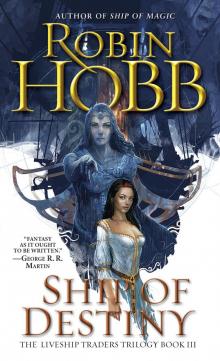 Ship of Destiny
Ship of Destiny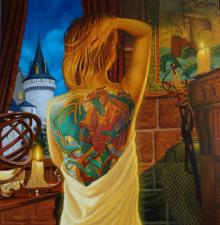 Golden Fool
Golden Fool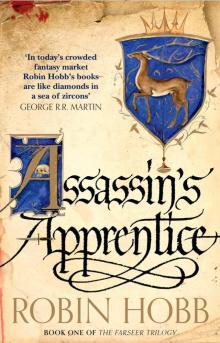 Assassins Apprentice
Assassins Apprentice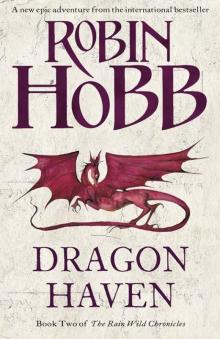 The Dragon Keeper
The Dragon Keeper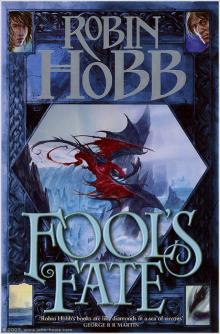 Fools Fate
Fools Fate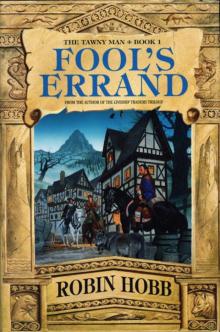 Fools Errand
Fools Errand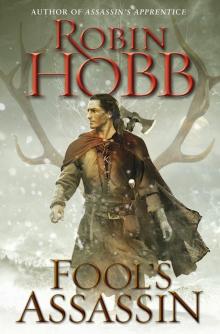 Fools Assassin
Fools Assassin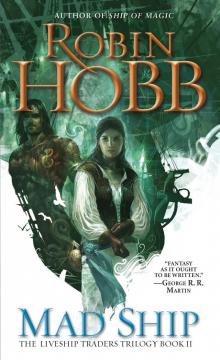 The Mad Ship
The Mad Ship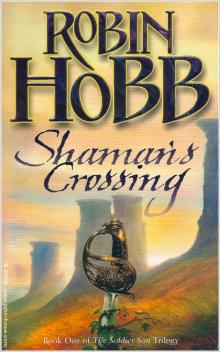 Shamans Crossing
Shamans Crossing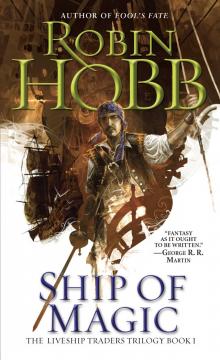 Ship of Magic
Ship of Magic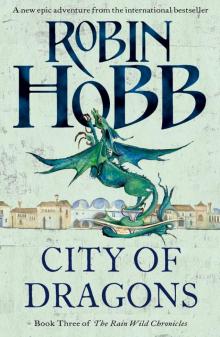 City of Dragons
City of Dragons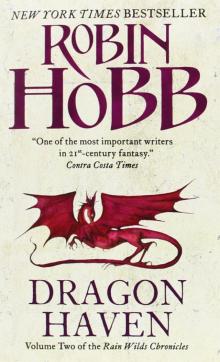 Dragon Haven
Dragon Haven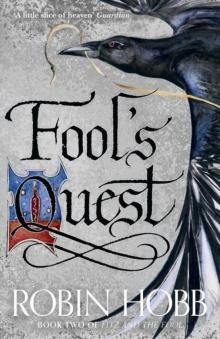 Fools Quest
Fools Quest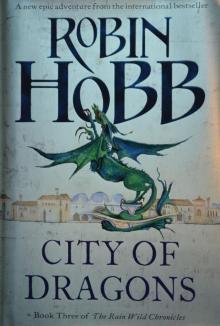 Blood of Dragons
Blood of Dragons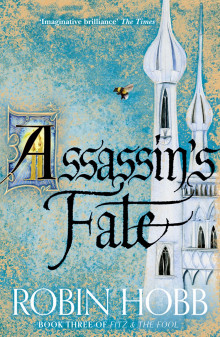 Assassin's Fate
Assassin's Fate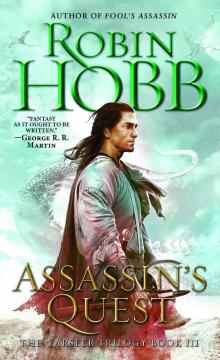 Assassins Quest
Assassins Quest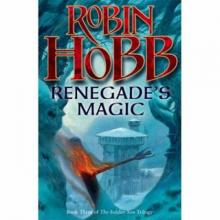 Renegades Magic
Renegades Magic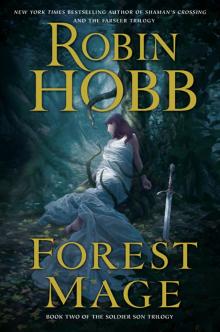 Forest Mage
Forest Mage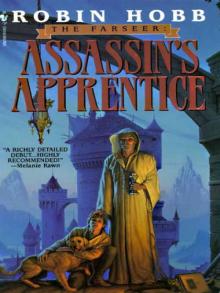 Assassin's Apprentice tft-1
Assassin's Apprentice tft-1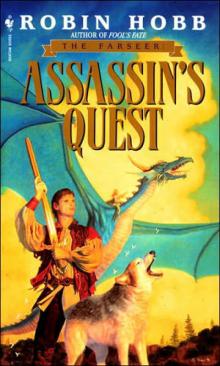 Assassin's Quest tft-3
Assassin's Quest tft-3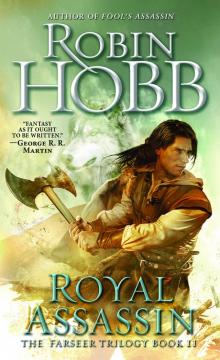 Royal Assassin
Royal Assassin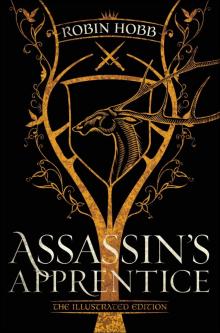 Assassin's Apprentice (The Illustrated Edition)
Assassin's Apprentice (The Illustrated Edition)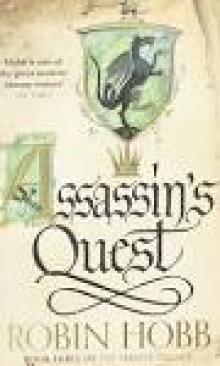 Assassin's Quest (UK)
Assassin's Quest (UK)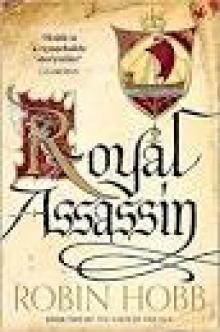 Royal Assassin (UK)
Royal Assassin (UK)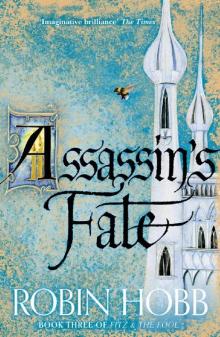 FF3 Assassin’s Fate
FF3 Assassin’s Fate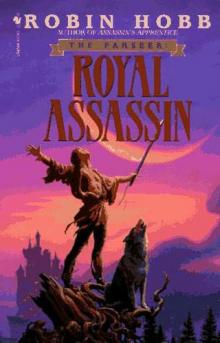 Royal Assassin tft-2
Royal Assassin tft-2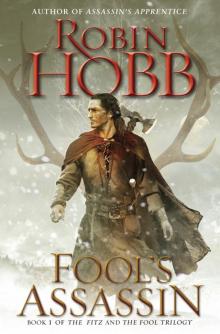 Fool’s Assassin: Book One of the Fitz and the Fool Trilogy
Fool’s Assassin: Book One of the Fitz and the Fool Trilogy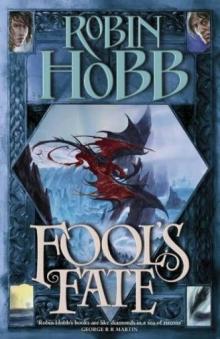 Fool's Fate ttm-3
Fool's Fate ttm-3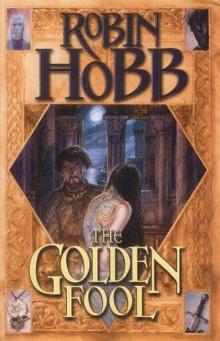 The Golden Fool ttm-2
The Golden Fool ttm-2 The Liveship Traders Series
The Liveship Traders Series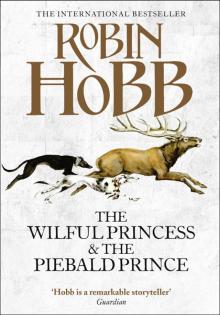 The Wilful Princess and the Piebald Prince
The Wilful Princess and the Piebald Prince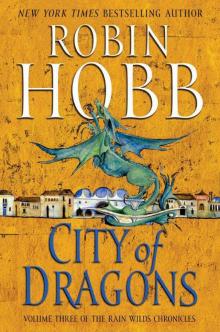 City of Dragons rwc-3
City of Dragons rwc-3 The Tawny Man 1 - Fool's Errand
The Tawny Man 1 - Fool's Errand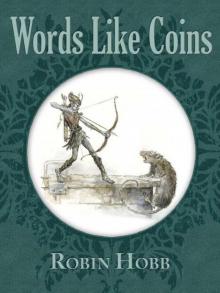 Words Like Coins
Words Like Coins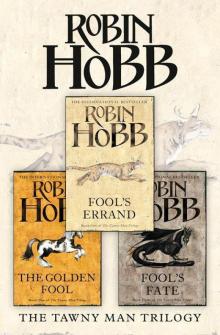 The Complete Tawny Man Trilogy Omnibus
The Complete Tawny Man Trilogy Omnibus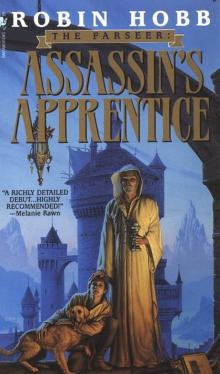 Farseer 1 - Assassin's Apprentice
Farseer 1 - Assassin's Apprentice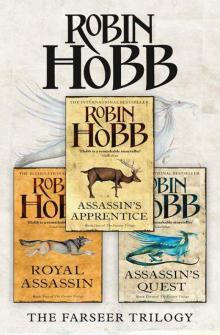 The Complete Farseer Trilogy Omnibus
The Complete Farseer Trilogy Omnibus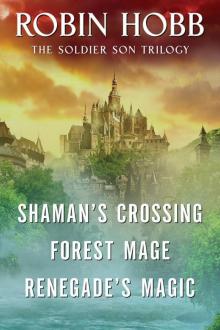 The Soldier Son Trilogy Bundle
The Soldier Son Trilogy Bundle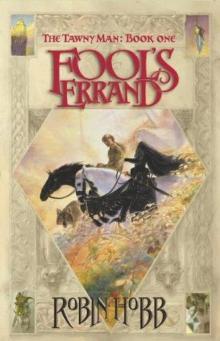 Fool's Errand ttm-1
Fool's Errand ttm-1 Blue Boots
Blue Boots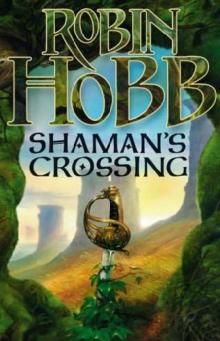 Shaman's Crossing ss-1
Shaman's Crossing ss-1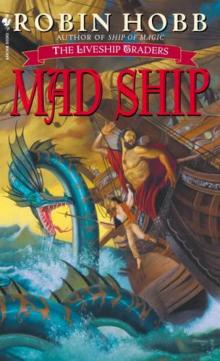 Mad Ship
Mad Ship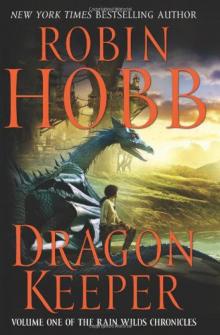 Dragon Keeper
Dragon Keeper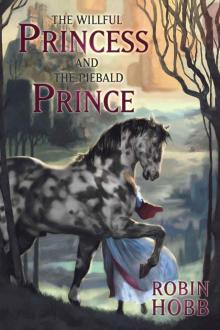 The Willful Princess and the Piebald Prince
The Willful Princess and the Piebald Prince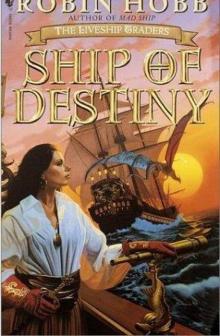 Ship of Destiny tlt-3
Ship of Destiny tlt-3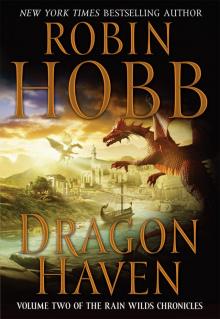 Rain Wild Chronicles 02 - Dragon Haven
Rain Wild Chronicles 02 - Dragon Haven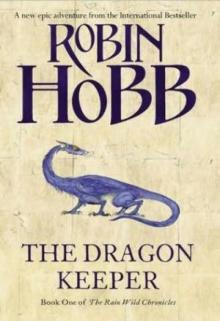 The Dragon Keeper trwc-1
The Dragon Keeper trwc-1 The Triumph
The Triumph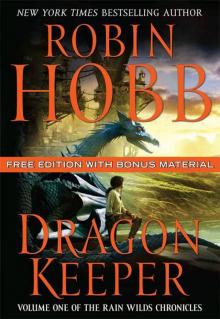 Dragon Keeper Free Edition with Bonus Material
Dragon Keeper Free Edition with Bonus Material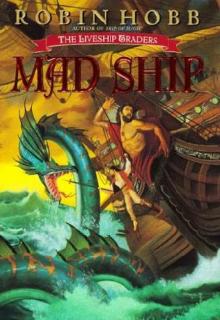 Mad Ship tlt-2
Mad Ship tlt-2 The Inheritance and Other Stories
The Inheritance and Other Stories Tawny Man 02 - Golden Fool
Tawny Man 02 - Golden Fool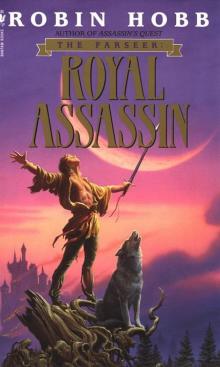 Farseer 2 - Royal Assassin
Farseer 2 - Royal Assassin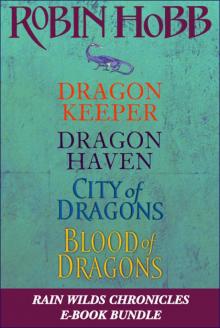 Rain Wilds Chronicles
Rain Wilds Chronicles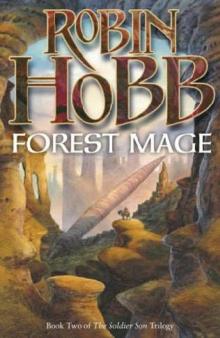 Forest Mage ss-2
Forest Mage ss-2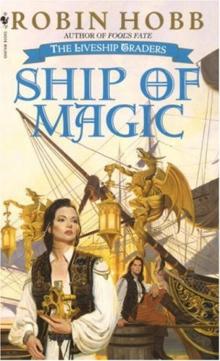 Ship of Magic lt-1
Ship of Magic lt-1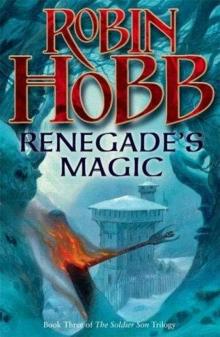 Renegade's Magic ss-3
Renegade's Magic ss-3